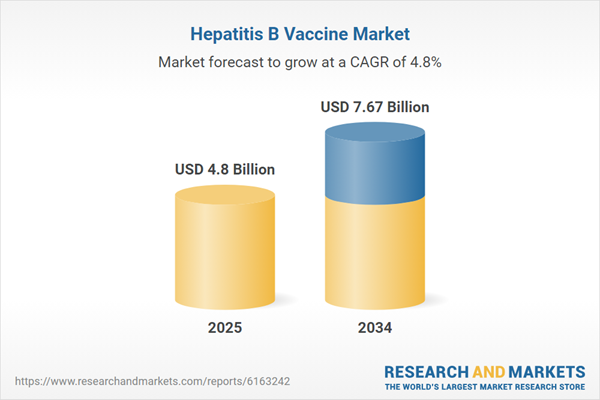Hepatitis B Vaccine: Introduction
Hepatitis B is a liver infection caused by the hepatitis B virus. The infection may be long term (chronic) or short term (acute). Chronic hepatitis B can put people at the risk of death from cirrhosis and liver cancer. It can spread through fluid transfusion from an infected person and even transfer from a mother to the child. Hepatitis B vaccinations play a crucial role in minimizing the risk of this fatal disease. The vaccinations can protect against the infection for at least 20 years.Hepatitis B Vaccine Market Analysis
With notable advancements within the range vaccines available, the hepatitis B vaccine market value has risen significantly in the recent years. Some of the notable authorized hepatis B vaccinations include Engerix-B, a noninfectious recombinant DNA vaccine, Heplisav-B®, Recombivax HB, and Twinrix hepatitis vaccine, which is indicated for both hepatitis A and B, adding versatility to the market.The hepatitis B vaccine market growth is likely to expediate with the on-going investigations. The U.S. CDC's initiative for Universal Hepatitis B Vaccination in Adults aged 19-59 signals a broader adoption trend. VTP-300, the hepatits B vaccination by Vaccitech is undergoing trials and has shown positive outcomes, indicating its breakthrough in upcoming years.
GSK plc's upcoming presentation at The Liver Meeting® 2023 is set to unveil insights from the B-Together phase IIb trial on bepirovirsen. It is an antisense oligonucleotide for chronic hepatitis B showcasing encouraging outcomes, especially in combination with pegylated interferon alfa. The trial evaluates the sequential regimen's efficacy in treating CHB infection, reducing hepatitis B surface antigen, and lowering virus DNA in the blood. Such developments hold a promising future for the vaccinations market in the forecast period.
Hepatitis B Vaccine Market Segmentation
Global Hepatitis B Vaccine Market Report and Forecast 2025-2034 offers a detailed analysis of the market based on the following segments:Market Breakup by Type
- Single Antigen
- Combination
Market Breakup by Age
- Pediatrics
- Adults
Market Breakup by End User
- Hospitals
- Clinics
- Vaccination Centres
- Others
Market Breakup by Region
- North America
- Europe
- Asia Pacific
- Latin America
- Middle East and Africa
Hepatitis B Vaccine Market Overview
The World Health Organization estimates that the world population may suffer with 1.5 million new hepatitis B infections every year, as a result, the hepatitis B vaccine market demand has increased significantly. North America, particularly the United States, has dominated the market in the historical period. The market share can be accredited to the presence of key market players offering advanced vaccines. The region's well-established healthcare infrastructure and high awareness levels have further propelled market growth.European market has also expanded with its robust healthcare system and proactive vaccination drives. The ongoing research and development activities by pharmaceutical companies, along with collaborations and partnerships among research institutions, continue to drive innovation in the region.
Going forward, Asia Pacific and Africa are poised to become pivotal centres for hepatitis B vaccine market share. These regions face a higher burden of hepatitis B infections, demanding high vaccination initiatives. Asia Pacific, being home to densely populated countries with emerging economies, is witnessing a surge in healthcare awareness and infrastructure development. The rising prevalence of hepatitis B in these regions amplifies the urgency for vaccination programs.
Hepatitis B Vaccine Market: Competitor Landscape
The key features of the market report include patent analysis, grants analysis, clinical trials analysis, funding and investment analysis, partnerships, and collaborations analysis by the leading key players. The major companies in the market are as follows:- Merck & Co., Inc.
- Sanofi S.A.
- Dynavax Technologies Corporation
- GlaxoSmithKline plc.
- Pancea Biotech Ltd
- Beijing Tiantan Biological Products Co., Ltd.
- VBI Vaccines Inc.
- Emmy Vaccine Co. Ltd.
- Beijing Minhai Biological Technology Co., Ltd.
This product will be delivered within 3-5 business days.
Table of Contents
Companies Mentioned
- Merck & Co.,Inc.
- Sanofi S.A.
- Dynavax Technologies Corporation
- GlaxoSmithKline plc.
- Pancea Biotech Ltd
- Beijing Tiantan Biological Products Co., Ltd.
- VBI Vaccines Inc.
- Emmy Vaccine Co.,Ltd.
- Beijing Minhai Biological Technology Co., Ltd.
Table Information
| Report Attribute | Details |
|---|---|
| No. of Pages | 350 |
| Published | July 2025 |
| Forecast Period | 2025 - 2034 |
| Estimated Market Value ( USD | $ 4.8 Billion |
| Forecasted Market Value ( USD | $ 7.67 Billion |
| Compound Annual Growth Rate | 4.8% |
| Regions Covered | Global |
| No. of Companies Mentioned | 9 |









